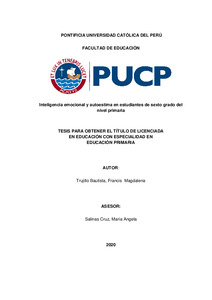| dc.contributor.advisor | Salinas Cruz, María Angela | |
| dc.contributor.author | Trujillo Bautista, Francis Magdalena | |
| dc.date.accessioned | 2020-12-03T17:28:31Z | |
| dc.date.available | 2020-12-03T17:28:31Z | |
| dc.date.created | 2020 | |
| dc.date.issued | 2020-12-03 | es_ES |
| dc.identifier.uri | http://hdl.handle.net/20.500.12404/17628 | |
| dc.description.abstract | En el Perú, los casos de violencia entre niños, adolescentes y jóvenes van aumentando
progresivamente. Generalmente estas se encuentran ligadas a un bajo desarrollo de la
regulación de emociones y a una baja autoestima. Es por ello que la presente
investigación de carácter cuantitativo correlacional tiene como objetivo determinar la
relación entre la inteligencia emocional y la autoestima en 65 estudiantes de 11 a 15
años de un colegio estatal en Lima, Perú. A la vez, se fomenta el conocimiento de la
relación de estas temáticas con el propósito de contribuir al cuidado de la salud mental
tanto individual como grupal. Para esta investigación, se administraron dos instrumentos
de evaluación de la muestra: el cuestionario de inteligencia emocional de Baron
(adaptación de Ugarriza y Pajares del Águila, 2002) y el cuestionario de Coopersmith
(adaptación de Panizo, 1988). Al finalizar la aplicación de los instrumentos, se
demuestra que existen relaciones significativas directas entre ambas variables.
Asimismo, se resalta que en la dimensión de la autoestima entre pares se encuentra
mayor desarrollada en la muestra, ello también se repite en la inteligencia emocional en
la dimensión interpersonal, es decir que los alumnos, a esta edad, en su gran mayoría
se comunican y se adaptan mejor con los demás, específicamente con sus pares. De
este modo, se recomienda realizar talleres para la mejora de la inteligencia emocional
y de la autoestima de forma grupal, principalmente, pues es la manera en que los niños
de la muestra evaluada se desenvuelven de manera adecuada en su mayoría. | es_ES |
| dc.description.abstract | In Peru, cases of violence among children, adolescents and young people are
progressively increasing. Generally these are linked to a low development of emotion
regulation and low self-esteem. That is why the present research of a correlational
quantitative nature aims to determine the relationship between emotional intelligence
and self-esteem in 65 students aged 11 to 15 years of a state school in Lima, Peru. At
the same time, the knowledge of the relationship of these issues is promoted with the
purpose of contributing to the care of mental health both individually and in groups. For
this research, two sample evaluation instruments were administered: the Baron's
emotional intelligence questionnaire (adapted from Ugarriza and Pajares del Águila,
2002) and the Coopersmith questionnaire (adapted from Panizo, 1988). At the end of
the application of the instruments, it is shown that there are direct significant relationships
between both variables. Likewise, it is highlighted that in the dimension of self-esteem
among peers it is more developed in the sample, this is also repeated in emotional
intelligence in the interpersonal dimension, that is to say that the students, at this age,
the vast majority communicate and they adapt better with others, specifically with their
peers. In this way, it is recommended to carry out workshops for the improvement of
emotional intelligence and self-esteem in a group, mainly, since it is the way in which the
children in the sample show themselves to develop adequately in the majority. | es_ES |
| dc.language.iso | spa | es_ES |
| dc.publisher | Pontificia Universidad Católica del Perú | es_ES |
| dc.rights | info:eu-repo/semantics/openAccess | es_ES |
| dc.rights.uri | http://creativecommons.org/licenses/by-nc-sa/2.5/pe/ | * |
| dc.subject | Educación primaria--Investigaciones | es_ES |
| dc.subject | Inteligencia emocional | es_ES |
| dc.subject | Autoestima en niños | es_ES |
| dc.title | Inteligencia emocional y autoestima en estudiantes de sexto grado del nivel primaria | es_ES |
| dc.type | info:eu-repo/semantics/bachelorThesis | es_ES |
| thesis.degree.name | Licenciado en Educación con especialidad en Educación Primaria | es_ES |
| thesis.degree.level | Título Profesional | es_ES |
| thesis.degree.grantor | Pontificia Universidad Católica del Perú. Facultad de Educación | es_ES |
| thesis.degree.discipline | Educación con especialidad en Educación Primaria | es_ES |
| renati.advisor.dni | 40115816 | |
| renati.advisor.orcid | https://orcid.org/0000-0001-8838-7980 | es_ES |
| renati.author.dni | 72852553 | |
| renati.discipline | 112016 | es_ES |
| renati.juror | Salinas Cruz, Maria Angela | |
| renati.juror | Bustamante Oliva, Lita Giannina | |
| renati.juror | Del Mastro Vecchione, Cristina | |
| renati.level | https://purl.org/pe-repo/renati/level#tituloProfesional | es_ES |
| renati.type | https://purl.org/pe-repo/renati/type#tesis | es_ES |
| dc.publisher.country | PE | es_ES |
| dc.subject.ocde | https://purl.org/pe-repo/ocde/ford#5.03.01 | |






